Unit1The lion and the mouse Story time & Grammar time课件(共41张PPT)
文档属性
| 名称 | Unit1The lion and the mouse Story time & Grammar time课件(共41张PPT) | 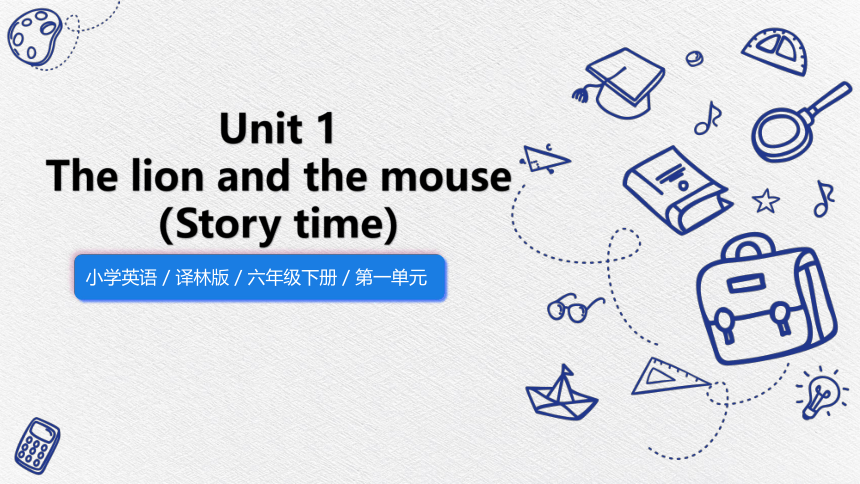 | |
| 格式 | zip | ||
| 文件大小 | 3.2MB | ||
| 资源类型 | 教案 | ||
| 版本资源 | 牛津译林版 | ||
| 科目 | 英语 | ||
| 更新时间 | 2023-01-09 22:19:08 | ||
图片预览

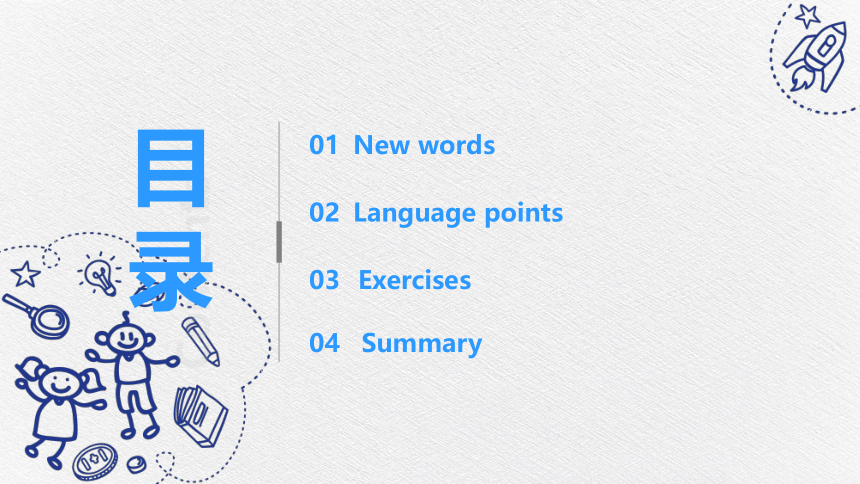
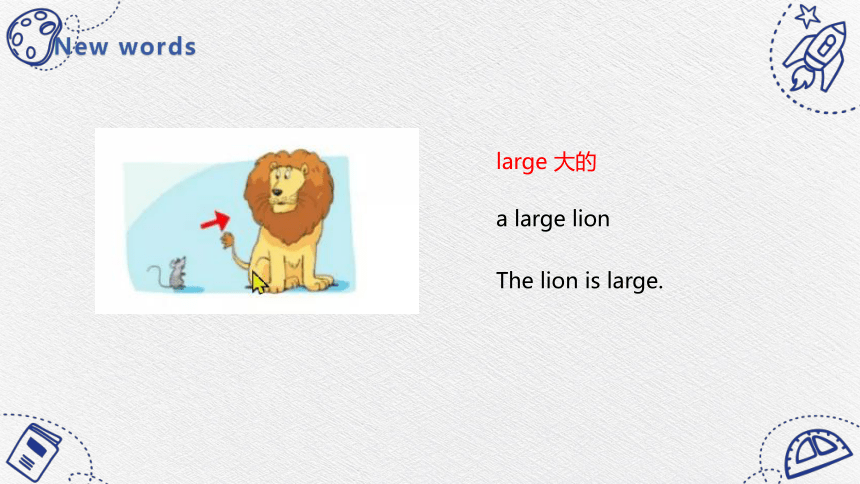
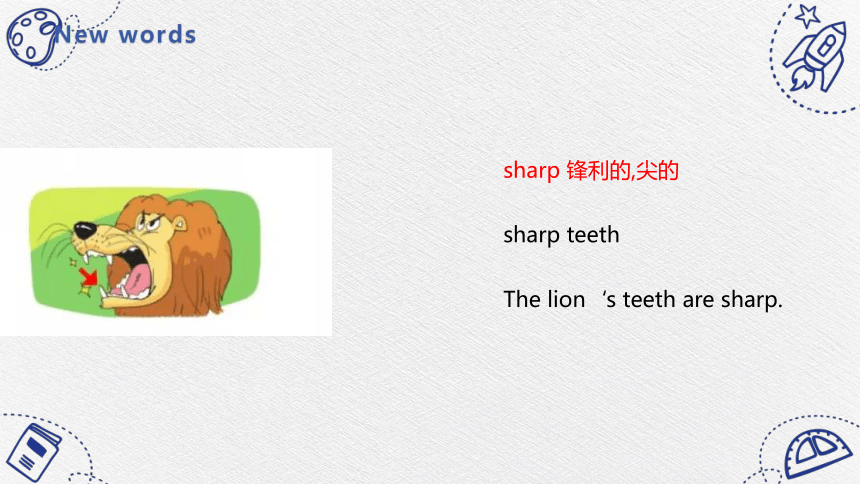
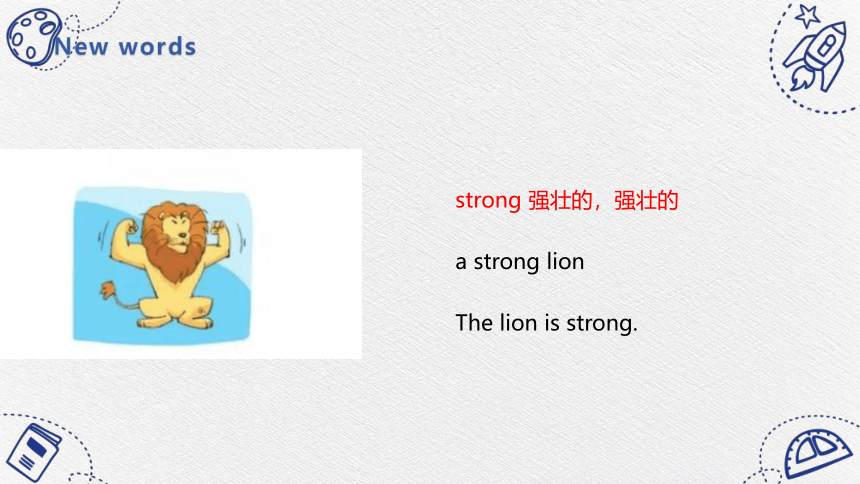
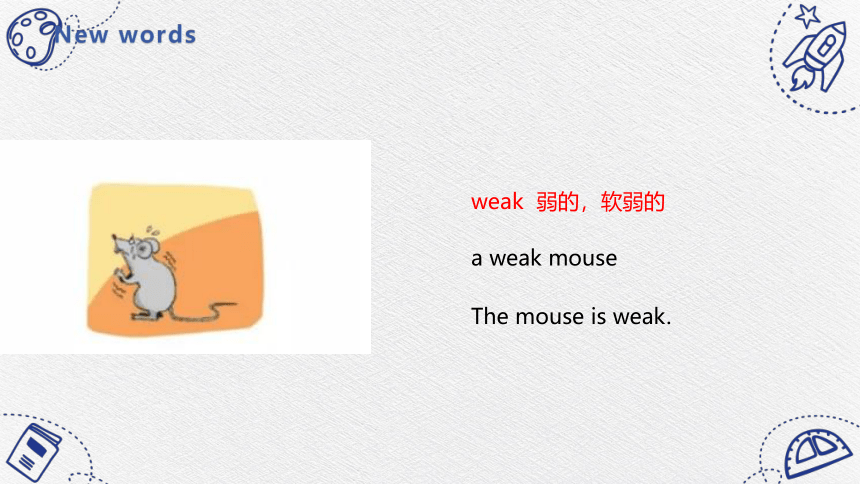
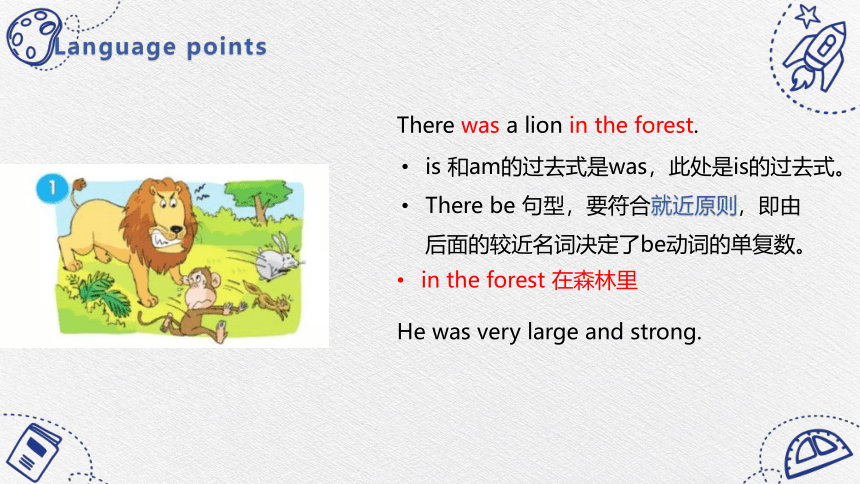
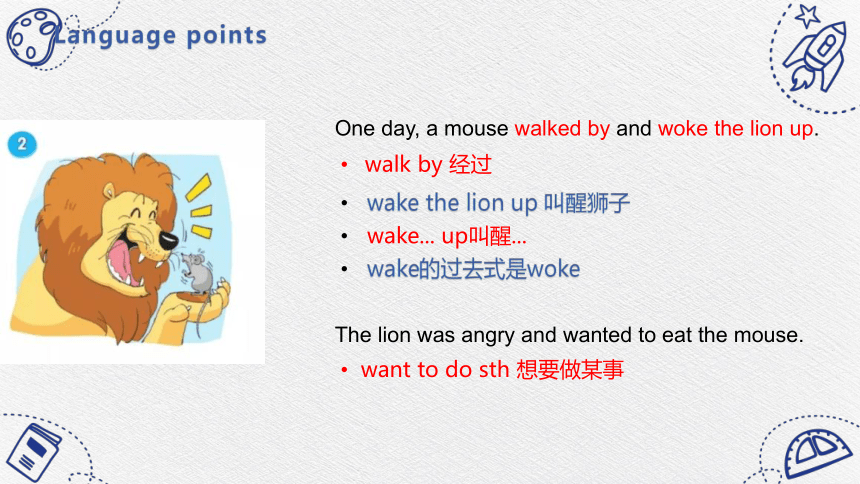
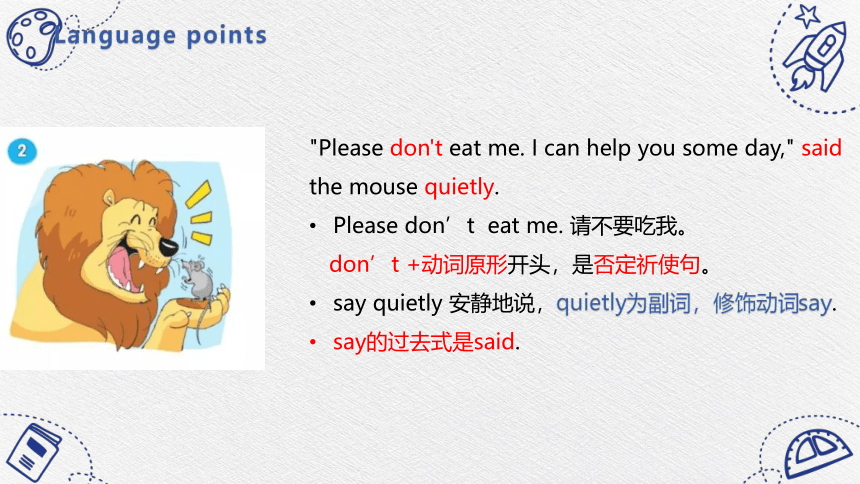
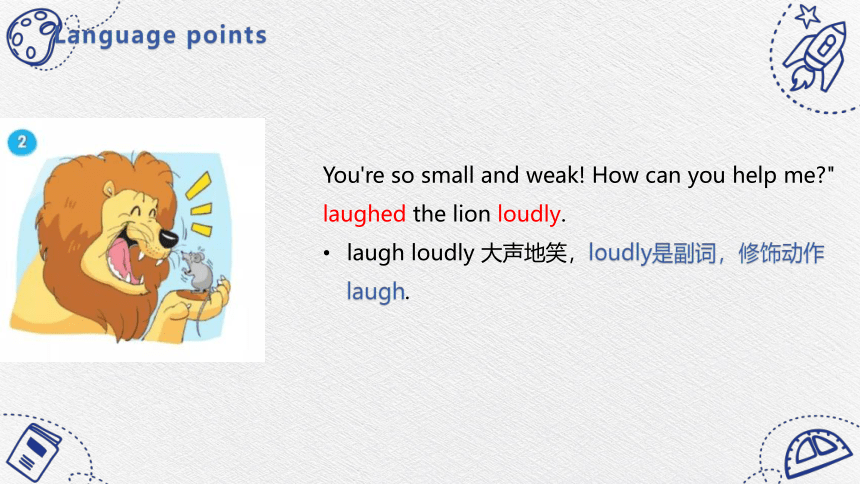

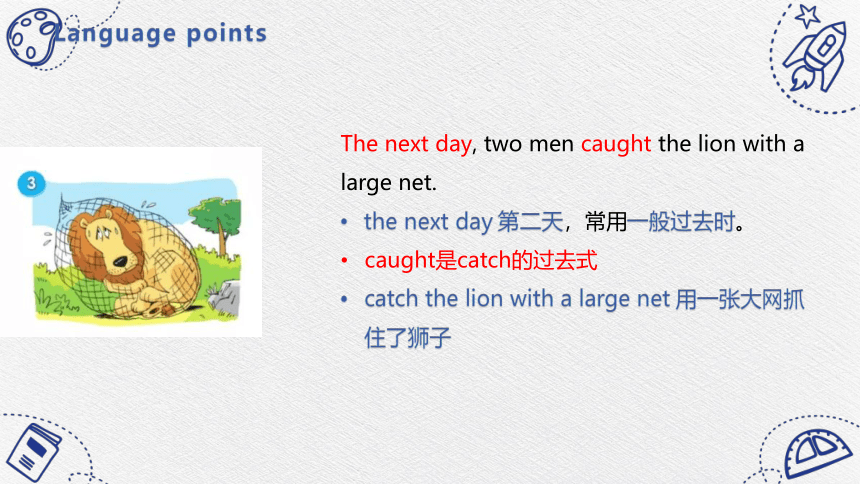
文档简介
(共41张PPT)
Unit 1
The lion and the mouse
(Story time)
小学英语 / 译林版 / 六年级下册 / 第一单元
Contents
目
录
02
Language points
New words
01
03
Exercises
04
Summary
New words
large 大的
a large lion
The lion is large.
New words
sharp 锋利的,尖的
sharp teeth
The lion‘s teeth are sharp.
New words
strong 强壮的,强壮的
a strong lion
The lion is strong.
New words
weak 弱的,软弱的
a weak mouse
The mouse is weak.
Language points
There was a lion in the forest.
in the forest 在森林里
He was very large and strong.
is 和am的过去式是was,此处是is的过去式。
There be 句型,要符合就近原则,即由后面的较近名词决定了be动词的单复数。
Language points
One day, a mouse walked by and woke the lion up.
The lion was angry and wanted to eat the mouse.
walk by 经过
wake the lion up 叫醒狮子
wake... up叫醒...
wake的过去式是woke
want to do sth 想要做某事
Language points
"Please don't eat me. I can help you some day," said the mouse quietly.
Please don’t eat me. 请不要吃我。
don’t +动词原形开头,是否定祈使句。
say quietly 安静地说,quietly为副词,修饰动词say.
say的过去式是said.
Language points
You're so small and weak! How can you help me " laughed the lion loudly.
laugh loudly 大声地笑,loudly是副词,修饰动作laugh.
Language points
Then, he let the mouse go.
let sb do 让某人做某事
let the mouse go 让老鼠走了
let的过去式是let
Language points
The next day, two men caught the lion with a large net.
the next day 第二天,常用一般过去时。
caught是catch的过去式
catch the lion with a large net 用一张大网抓住了狮子
Language points
The lion bit the net with his sharp teeth, but that did not help.
bit是bite的过去式
bite the net with his sharp teeth 用他锋利的牙齿咬网
"How can I get out " asked the lion sadly.
get out 出去
ask sadly 伤心地问,sadly是副词,修饰动词ask.
Language points
Just then, the mouse saw the lion. "I can help you," he said.
just then 就在那时
saw是see的过去式
Soon,the mouse made a big hole in the net with his teeth.
made是make的过去式
make a big hole in the net with his teeth 用他的牙齿在网上做了一个大洞
Language points
The lion got out."Thank you!" said the lion happily.
got是get的过去式
say happily 高兴地说,happily是副词,修饰动词say.
Language points
From then on, the lion and the mouse became friends.
from then on 从那时起,常用一般过去时
became是become的过去式
become friends 成为朋友
Exercise
1. She looks ______(happy).
2. The kid looked _______(happy) at us and smiled.
3. Don’t talk ______(loud) in the classroom.
4. Run quickly, boys and girls.(改为否定祈使句)
_____ _______ quickly, boys and girls.
5. We made many flowers ____ the paper.
A. with B.for C.by D.at
答案:1.happy 2.happily 3.loudly 4.Don’t run 5.A
Unit 1
The lion and the mouse
(Grammar time)
小学英语 / 译林版 / 六年级下册 / 第一单元
Contents
目
录
02
Grammar time
Warm up
01
03
Exercises
04
Summary
Warm up
is/am
walk
laugh
let
catch
bite
do
see
ask
get
make
say
become
was
walked
laughed
let
caught
bit
did
saw
asked
got
made
said
became
回顾Story time中的动词过去式
Warm up
It has sharp teeth
Mike looks sad.
She is tall.
找一找这些句子中的形容词。
总结这些形容词的用法。
形容词+名词
look+形容词
be动词+形容词
Grammar time
Grammar 1 :副词的用法
Grammar 2 :一般过去时
Grammar time 1
对比以下两个句子:
The boy is sad.
The boy is crying sadly.
找出形容词与副词,看看他们的用法分别是什么?
be动词+形容词
副词修饰动词
Grammar time 1
对比以下两个句子:
He is a happy child.
The child laughs happily.
找出形容词与副词,看看他们的用法分别是什么?
形容词+名词
副词修饰动词
Grammar time 1
动词
副词
副词的用法:
副词修饰动词
Grammar time 1
如何由形容词转化成副词?
excited
quiet
loud
sad
happy
excitedly
quietly
loudly
sadly
happily
辅音字母+y结尾的形容词,
去y变成i+ly ---副词
形容词+ly --- 副词
Exercise
一、写词下列形容词的副词形式
1. quick ____________________ 2. easy____________________
3. beautiful_________________ 4. quiet___________________
5. heavy____________________ 6. wonderful _____________
7. angry____________________ 8. bad ____________________
答案:1.quickly 2.easily 3.beautifully 4.quietly
5.heavily 6.wonderfully 7.angrily 8.badly
Exercise
二、适当形式填空
1. Tom looks _______(happy) today.
2. He is looking______(happy) at the photo of his family.
3. They are _______(excited) about the football match.
4. We cheered (加油)for our school basketball team _______(excited).
5. She is a _______(quiet) girl and always reads books ______(quiet)
on weekends.
6. Don’t run so ________(quick). We should be _________(careful).
答案:1.happy 2.happily 3.excited
4.excitedly 5.quiet,quietly 6.quickly,careful
Grammar time 2
一般过去时
定义:①过去某个时间发生的动作或存在的状态
②过去经常或反复发生的动作。
eg:① She was 11 years old last year.
We had a picnic yeasterday.
② I usually went to school by bus last term.
Liu Tao often played football with his friends when
he was young.
Grammar time 2
一般过去时常用时间状语:
① yesterday,yesterday evening...
② last year,last summer,last Tuesday...
③ two days ago,a week ago...
④ this morning...
⑤ in 2019...
⑥ once(曾经),just now (刚才) ...
Grammar time 2
一般过去时的结构:动词的过去式
1.过去式的规则变化:
①一般情况:动词词尾加ed listen-listened
②以不发音的e结尾的动词词尾加d live-lived
③以“辅音字母+y”结尾额动词,变y为i,加ed study-studies
④以“辅元辅”结尾的动词,双写结尾字母,再加ed stop-stopped
Grammar time 2
2.常见的动词过去式的不规则变化有:
am/is -was are -were go -went do - did
put-put cut - cut run-ran say -said
fly-flew come-came make-made take-took
write-wrote have - had get-got sit-sat
eat- ate see - saw begin-began can- could
Grammar time 2
let -let teach-taught wake-woke catch -caught
bite-bit become-became hear-heard speak-spoke
tell-told draw-drew read-read think-thought
sing-sang stand-stood find-found know -knew
meet-met sleep-slept swim-swam feel-felt
wear-wore hurt-hurt drink-drank buy-bought
Grammar time 2
一般过去时的句型变化
1.be动词的一般过去时:
肯定句:be动词的过去式(was, were)
否定句:be动词的过去式(was, were)+ not
疑问句:Be 动词的过去式(was, were)+主语 ...
eg:He was happy yesterday.
He was not happy yesterday.
Was he happy yesterday
Grammar time 2
2.行为动词的一般过去时:
肯定句:主语 + 行为动词的过去式+其他.
否定句:主语 +didn’t + 动词原形+其他.
疑问句:...did +主语+动词原形 +其他
eg:He watched a football match yesterday.
He didn’t watch a football match yesterday.
Did he watch a football match yesterday
Exercise
一、写出下列动词的过去式
hurt-______ carry-_____ stay-______ shop-_____
are-______ see-______ eat-______ have-_____
plan-______ take-______ tell-______ make-_____
buy-______ let -______ play- ______ bite- ______
答案: hurt carried stayed shopped
were saw ate had
planned took told made
bought let played bite
Exercise
二、适当形式填空
1.Yang Ling____________(be)ten years old last year.
2.There_____________(not be)any juice in the fridge yesterday.
3.How many people _____________(be)there in your class last term
4.Mary____________(live)in Nanjing two years ago.
5.The cat _________ (eat)a mouselast night.
答案:1.was 2.wasn’t 3.were 4.lived 5.ate
Exercise
6.We___________(have)a party last weekend.
7.Alice _____________(not pick)up any oranges on the farm last week.
8.I ____________(make)a birthday card for mum yesterday.
9.—What time _______ you __________ (get)to Beijing yesterday
一We___________(get) to Beijing at 9:00 in the evening.
10._______your sister ___________(write) an e—mail yesterday
答案: 6.had 7.didn’t pick 8.made 9.did,get,got 10.Did,write
Exercise
三、句型转化
1. He was a worker in 2003. (改成一般疑问句)
2.He saw a film last night. (改成否定句及一般疑问句)
答案:1.Was he a worker in 2003?
2.He didn’t see a film last night.
Did he see a film last night.
Exercise
3.I did my homework yesterday evening. (改成否定句及一般疑问句)
4. The students played football just now.(划线部分提问)
答案: 3. I didn’t do my homework yesterday evening.
Did you do your homework yesterday evening.
4.What did the students do just now
THANKS
感谢您的观看
Unit 1
The lion and the mouse
(Story time)
小学英语 / 译林版 / 六年级下册 / 第一单元
Contents
目
录
02
Language points
New words
01
03
Exercises
04
Summary
New words
large 大的
a large lion
The lion is large.
New words
sharp 锋利的,尖的
sharp teeth
The lion‘s teeth are sharp.
New words
strong 强壮的,强壮的
a strong lion
The lion is strong.
New words
weak 弱的,软弱的
a weak mouse
The mouse is weak.
Language points
There was a lion in the forest.
in the forest 在森林里
He was very large and strong.
is 和am的过去式是was,此处是is的过去式。
There be 句型,要符合就近原则,即由后面的较近名词决定了be动词的单复数。
Language points
One day, a mouse walked by and woke the lion up.
The lion was angry and wanted to eat the mouse.
walk by 经过
wake the lion up 叫醒狮子
wake... up叫醒...
wake的过去式是woke
want to do sth 想要做某事
Language points
"Please don't eat me. I can help you some day," said the mouse quietly.
Please don’t eat me. 请不要吃我。
don’t +动词原形开头,是否定祈使句。
say quietly 安静地说,quietly为副词,修饰动词say.
say的过去式是said.
Language points
You're so small and weak! How can you help me " laughed the lion loudly.
laugh loudly 大声地笑,loudly是副词,修饰动作laugh.
Language points
Then, he let the mouse go.
let sb do 让某人做某事
let the mouse go 让老鼠走了
let的过去式是let
Language points
The next day, two men caught the lion with a large net.
the next day 第二天,常用一般过去时。
caught是catch的过去式
catch the lion with a large net 用一张大网抓住了狮子
Language points
The lion bit the net with his sharp teeth, but that did not help.
bit是bite的过去式
bite the net with his sharp teeth 用他锋利的牙齿咬网
"How can I get out " asked the lion sadly.
get out 出去
ask sadly 伤心地问,sadly是副词,修饰动词ask.
Language points
Just then, the mouse saw the lion. "I can help you," he said.
just then 就在那时
saw是see的过去式
Soon,the mouse made a big hole in the net with his teeth.
made是make的过去式
make a big hole in the net with his teeth 用他的牙齿在网上做了一个大洞
Language points
The lion got out."Thank you!" said the lion happily.
got是get的过去式
say happily 高兴地说,happily是副词,修饰动词say.
Language points
From then on, the lion and the mouse became friends.
from then on 从那时起,常用一般过去时
became是become的过去式
become friends 成为朋友
Exercise
1. She looks ______(happy).
2. The kid looked _______(happy) at us and smiled.
3. Don’t talk ______(loud) in the classroom.
4. Run quickly, boys and girls.(改为否定祈使句)
_____ _______ quickly, boys and girls.
5. We made many flowers ____ the paper.
A. with B.for C.by D.at
答案:1.happy 2.happily 3.loudly 4.Don’t run 5.A
Unit 1
The lion and the mouse
(Grammar time)
小学英语 / 译林版 / 六年级下册 / 第一单元
Contents
目
录
02
Grammar time
Warm up
01
03
Exercises
04
Summary
Warm up
is/am
walk
laugh
let
catch
bite
do
see
ask
get
make
say
become
was
walked
laughed
let
caught
bit
did
saw
asked
got
made
said
became
回顾Story time中的动词过去式
Warm up
It has sharp teeth
Mike looks sad.
She is tall.
找一找这些句子中的形容词。
总结这些形容词的用法。
形容词+名词
look+形容词
be动词+形容词
Grammar time
Grammar 1 :副词的用法
Grammar 2 :一般过去时
Grammar time 1
对比以下两个句子:
The boy is sad.
The boy is crying sadly.
找出形容词与副词,看看他们的用法分别是什么?
be动词+形容词
副词修饰动词
Grammar time 1
对比以下两个句子:
He is a happy child.
The child laughs happily.
找出形容词与副词,看看他们的用法分别是什么?
形容词+名词
副词修饰动词
Grammar time 1
动词
副词
副词的用法:
副词修饰动词
Grammar time 1
如何由形容词转化成副词?
excited
quiet
loud
sad
happy
excitedly
quietly
loudly
sadly
happily
辅音字母+y结尾的形容词,
去y变成i+ly ---副词
形容词+ly --- 副词
Exercise
一、写词下列形容词的副词形式
1. quick ____________________ 2. easy____________________
3. beautiful_________________ 4. quiet___________________
5. heavy____________________ 6. wonderful _____________
7. angry____________________ 8. bad ____________________
答案:1.quickly 2.easily 3.beautifully 4.quietly
5.heavily 6.wonderfully 7.angrily 8.badly
Exercise
二、适当形式填空
1. Tom looks _______(happy) today.
2. He is looking______(happy) at the photo of his family.
3. They are _______(excited) about the football match.
4. We cheered (加油)for our school basketball team _______(excited).
5. She is a _______(quiet) girl and always reads books ______(quiet)
on weekends.
6. Don’t run so ________(quick). We should be _________(careful).
答案:1.happy 2.happily 3.excited
4.excitedly 5.quiet,quietly 6.quickly,careful
Grammar time 2
一般过去时
定义:①过去某个时间发生的动作或存在的状态
②过去经常或反复发生的动作。
eg:① She was 11 years old last year.
We had a picnic yeasterday.
② I usually went to school by bus last term.
Liu Tao often played football with his friends when
he was young.
Grammar time 2
一般过去时常用时间状语:
① yesterday,yesterday evening...
② last year,last summer,last Tuesday...
③ two days ago,a week ago...
④ this morning...
⑤ in 2019...
⑥ once(曾经),just now (刚才) ...
Grammar time 2
一般过去时的结构:动词的过去式
1.过去式的规则变化:
①一般情况:动词词尾加ed listen-listened
②以不发音的e结尾的动词词尾加d live-lived
③以“辅音字母+y”结尾额动词,变y为i,加ed study-studies
④以“辅元辅”结尾的动词,双写结尾字母,再加ed stop-stopped
Grammar time 2
2.常见的动词过去式的不规则变化有:
am/is -was are -were go -went do - did
put-put cut - cut run-ran say -said
fly-flew come-came make-made take-took
write-wrote have - had get-got sit-sat
eat- ate see - saw begin-began can- could
Grammar time 2
let -let teach-taught wake-woke catch -caught
bite-bit become-became hear-heard speak-spoke
tell-told draw-drew read-read think-thought
sing-sang stand-stood find-found know -knew
meet-met sleep-slept swim-swam feel-felt
wear-wore hurt-hurt drink-drank buy-bought
Grammar time 2
一般过去时的句型变化
1.be动词的一般过去时:
肯定句:be动词的过去式(was, were)
否定句:be动词的过去式(was, were)+ not
疑问句:Be 动词的过去式(was, were)+主语 ...
eg:He was happy yesterday.
He was not happy yesterday.
Was he happy yesterday
Grammar time 2
2.行为动词的一般过去时:
肯定句:主语 + 行为动词的过去式+其他.
否定句:主语 +didn’t + 动词原形+其他.
疑问句:...did +主语+动词原形 +其他
eg:He watched a football match yesterday.
He didn’t watch a football match yesterday.
Did he watch a football match yesterday
Exercise
一、写出下列动词的过去式
hurt-______ carry-_____ stay-______ shop-_____
are-______ see-______ eat-______ have-_____
plan-______ take-______ tell-______ make-_____
buy-______ let -______ play- ______ bite- ______
答案: hurt carried stayed shopped
were saw ate had
planned took told made
bought let played bite
Exercise
二、适当形式填空
1.Yang Ling____________(be)ten years old last year.
2.There_____________(not be)any juice in the fridge yesterday.
3.How many people _____________(be)there in your class last term
4.Mary____________(live)in Nanjing two years ago.
5.The cat _________ (eat)a mouselast night.
答案:1.was 2.wasn’t 3.were 4.lived 5.ate
Exercise
6.We___________(have)a party last weekend.
7.Alice _____________(not pick)up any oranges on the farm last week.
8.I ____________(make)a birthday card for mum yesterday.
9.—What time _______ you __________ (get)to Beijing yesterday
一We___________(get) to Beijing at 9:00 in the evening.
10._______your sister ___________(write) an e—mail yesterday
答案: 6.had 7.didn’t pick 8.made 9.did,get,got 10.Did,write
Exercise
三、句型转化
1. He was a worker in 2003. (改成一般疑问句)
2.He saw a film last night. (改成否定句及一般疑问句)
答案:1.Was he a worker in 2003?
2.He didn’t see a film last night.
Did he see a film last night.
Exercise
3.I did my homework yesterday evening. (改成否定句及一般疑问句)
4. The students played football just now.(划线部分提问)
答案: 3. I didn’t do my homework yesterday evening.
Did you do your homework yesterday evening.
4.What did the students do just now
THANKS
感谢您的观看
